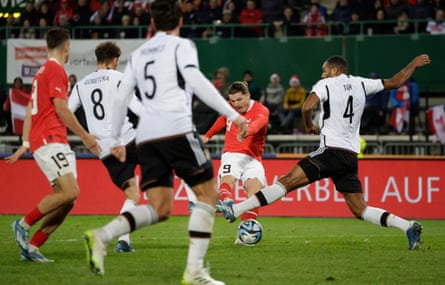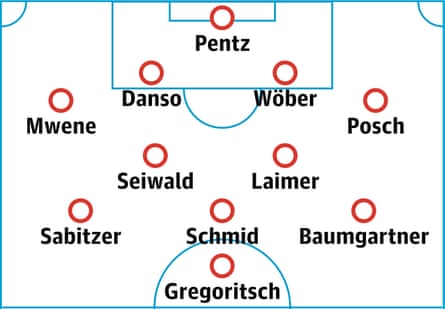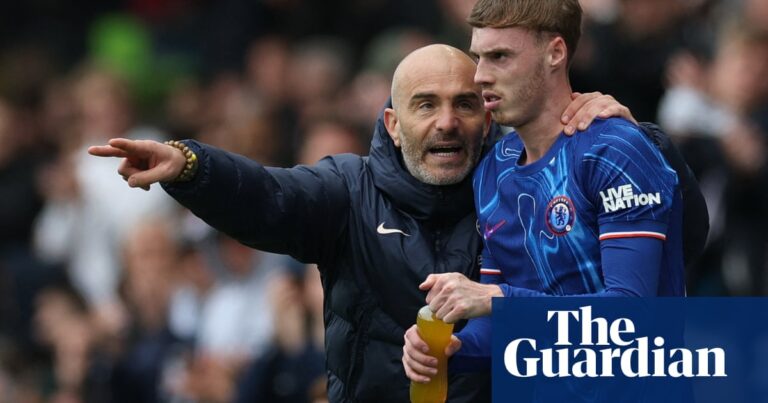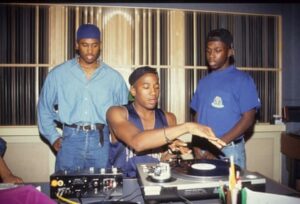This article is part of the Guardian’s Euro 2024 Experts’ Network, a cooperation between some of the best media organisations from the 24 countries who qualified. theguardian.com is running previews from two countries each day in the run-up to the tournament kicking off on 14 June.
Prospects
Everything was almost too good to be true: Austria had impressed in qualification, securing second place in their group behind Belgium, as well as a friendly win over Germany. Then they suddenly suffered more body blows than a fighter in a heavyweight title bout: their talisman, David Alaba, suffered a serious injury; the coach, Ralf Rangnick, was linked with a move to Bayern Munich, and the key midfielder Xaver Schlager was ruled out of the tournament.
Now what? Alaba is certainly going to miss out, but Rangnick remains committed to Austria – and included the Real Madrid defender as a non-playing captain for the tournament. “I’ve talked a lot with David; he really wanted to be part of the team,” said Rangnick. It may turn out to be a good call but the pre-tournament euphoria has somewhat faded back in Austria.
There is still hope of a strong run though, despite the setbacks and a tough draw. A good spirit and a certain unpredictability could take this side far. With Austria, Rangnick has modified his preferred 4-4-2 formation and mainly relied on 4-2-3-1. His signature strategies, as before, are high pressing, fast transitions and intense running. He implemented his thinking over the years at Salzburg and Leipzig, and it became known as the Red Bull philosophy.
Rangnick himself, however, does not call it that. “As far as I am concerned there is no such thing as Red Bull football,” he says. “It was always clear that we play a style of football aimed at controlling the game, regardless of whether we or the opponent have the ball. This can only be achieved with a clear plan.“
High and precise demands are placed on each player, with everyone knowing what they have to do but the coach also wants the players to take responsibility. “A good coach transfers his vision of football into the minds and hearts of the players,” he has said.
How the team manages expectation will be key this summer. A good performance would not be a surprise, but how far that will take them is the great unknown.
The coach
It appears that Austria and Ralf Rangnick are a perfect match. The 65-year-old took over from Franco Foda in 2022, imprinted his style on the team and achieved strong results that could no longer be called coincidental. It’s not easy for a German to be loved in Austria, but Rangnick has delivered the kind of football the country has long desired, capturing their hearts in the process. He nearly broke all of them amid rumours swirling that he was moving to Bayern. The relief was immense when it was announced he would stay. Rangnick is a coach of clear instructions and a man of clear words, which is appreciated here. In an interview with Der Standard he discussed climate, poverty, wars and migration, reflecting on the political realities in Austria and Germany: “I see the danger of right-wing extremists coming to power and promising simple solutions to complex problems.“
The icon
Marcel Sabitzer has continually reinvented himself. After impressive performances at RB Leipzig, he moved to Bayern Munich, where he struggled to establish himself, and his subsequent loan to Manchester United was similarly inauspicious. Some wondered if the midfielder was on the decline. However, with his transfer to Borussia Dortmund he made a significant breakthrough, enjoying a fantastic season and playing a key role in the team reaching the Champions League final. Off the pitch the 30-year-old is not the loudest or one to make headlines. But on the field he makes the difference. In the absence of Alaba, Sabitzer will be called upon to take extra responsibility .

One to watch
Football careers sometimes require patience. Nicolas Seiwald has needed plenty of it, having not had the playing time he would have hoped for since moving to Leipzig last year. Yet the defensive midfielder is a dream for any coach; he embodies everything one could want from the position. The 23-year-old plays unobtrusively but effectively, seldom makes mistakes, and can dictate the rhythm and pace of a game, which is exceptional for someone his age. It is only a matter of time before he, too, is in the spotlight.
after newsletter promotion
The maverick
No player, except Alaba, has shaped Austrian football in the past decade as much as Marko Arnautovic. He is the man who awakens dreams and then shatters them, a player whose talent enters the pitch before he does, someone who can do everything, needs to do little, and now finally has his big title in Serie A with Internazionale. The 35-year-old is many things; above all, he leaves no one indifferent – either you love him or hate him. On the field, he is a wildcard, the man for the unusual and the special. Sometimes only one touch or one interview are enough to further cement his status.
The spine
Austria are dealing with the losses of the goalkeeper Alexander Schlager, the defender Alaba, and the midfielder Xaver Schlager after injuries, so it is probably fair to say that this team has had a large chunk of its spine ripped out. However, Patrick Pentz will provide a solid foundation in goal. Replacing Alaba in defence is impossible, but Stefan Posch, who helped Bologna reach the Champions League this season, is expected to anchor the right side of the defence. He brings both defensive quality and an ability to contribute to the attack. In midfield, Konrad Laimer of Bayern Munich is suddenly more crucial than ever: his high-level quality will be indispensable. Up front, everything relies on Michael Gregoritsch. The striker is responsible for scoring and creating space in the buildup – he is a forward who thrives on confidence and Rangnick provides it.
Probable starting XI

Celebrity fan
Austria’s contributions to the global array of stars have been modest since Falco, and Arnold Schwarzenegger – though an annual fixture at the ski races in Kitzbühel – is not particularly noted for his closeness to football. Christoph Waltz also appears to have better things to do than attend games. Thus we must dig a little deeper – possibly fulfilling a mission of enlightenment in the process. The viral clip of Diego Maradona warming up effortlessly by coolly juggling the ball is soundtracked by the Austrian band Opus’s song Live is Life. Ewald Pfleger, the band’s frontman, is a fan of the club Grazer AK.
Culinary delight
There are combinations that are made for each other: Austria’s national team and Rangnick; Alaba and the Champions League. Moving from sport to the canteen there is another: Austria loves the combination of meat and bread. In all its forms. We layer it, eat it side by side, stuff one inside the other. It can be as humble as a Wurstsemmel, which is revered in Austria. Or a sausage next to a slice of bread or in a hotdog. The possibilities seem so simple, yet they are infinitely complex. Add football to the equation and you could almost speak of a holy trinity.
The Austria team guide was written by Andreas Hagenauer for Der Standard
Source: theguardian.com


















